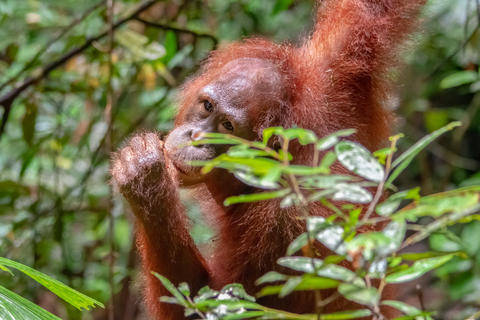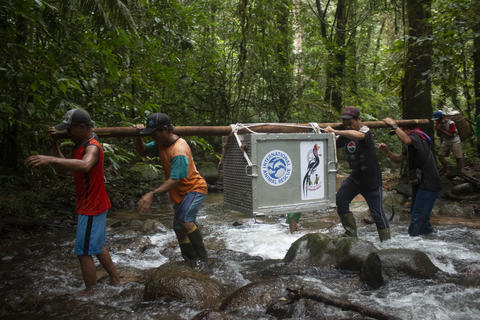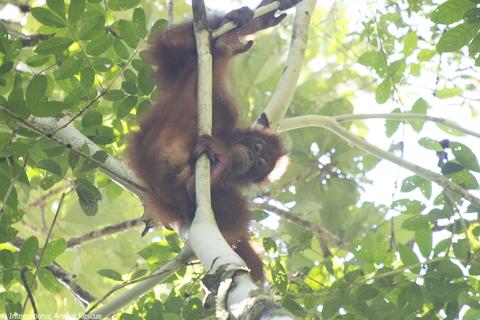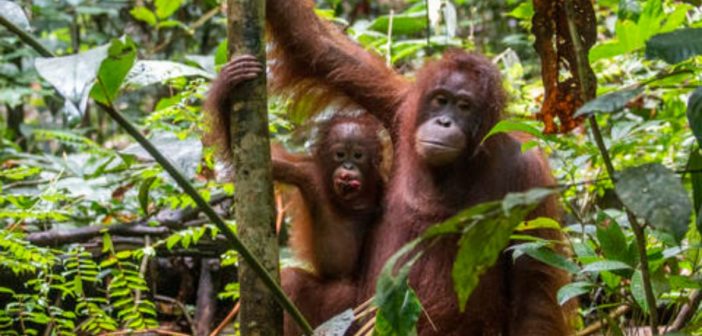After years of rehabilitation, six orangutans have been returned to freedom in the Bornean rainforest. The release operation was carried out by International Animal Rescue (IAR) alongside the representatives of the national park where they were released.
We joined forces with Bukit Baka Bukit Raya National Park (TNBBBR) and the Natural Resources Conservation Agency of West Kalimantan (BKSDA) to release the orangutans inside the TNBBBR area on February 14th.
All six individuals had undergone rehabilitation at our orangutan conservation center in Ketapang, West Kalimantan (Indonesian Borneo). The group included mother and infant Maili and Osin. This was the first time that a mother and baby had undergone rehabilitation and then been released in the National Park. The four other orangutans released with Maili and Osin were Lady, Obi, Muria and Zoya.
During the rehabilitation  process, orangutans are placed in groups on artificial islands to simulate conditions in the wild. The environment is used to encourage the orangutans’ natural behavior. They are able to hone their natural skills, spending their days climbing, foraging for food and building a nest to sleep in each night.
process, orangutans are placed in groups on artificial islands to simulate conditions in the wild. The environment is used to encourage the orangutans’ natural behavior. They are able to hone their natural skills, spending their days climbing, foraging for food and building a nest to sleep in each night.
Maili had come into our Orangutan Conservation Center in Ketapang in 2015 after being kept as a pet. Baby Osin was the result of a union between Maili and one of the male orangutans undergoing rehabilitation on the island.
Lady is a 10 year old female orangutan who was rescued from a mine in 2010. After undergoing rehabilitation for more than eight years, Lady was finally deemed ready to return to her natural habitat.
Male orangutan Obi had apparently been found by a farmer next to an oil palm plantation. Obi was kept as a pet for 10 months in shocking conditions. He was fed a highly unsuitable diet of rice, prawns, cake, fizzy drinks and occasionally some fruit. Obi arrived at our center in 2014 to start his rehabilitation. He is now eight years old and, based on months of behavioral monitoring, he had been confirmed ready to return to the forest.
 Female orangutan Muria was kept by a stallholder as a pet for more than three years. However, after learning that it was illegal to keep an orangutan, her owner finally surrendered Muria to the West Kalimantan BKSDA for rehabilitation at our center in 2014. She was an independent orangutan who soon displayed the natural behaviors she would need to survive in the wild.
Female orangutan Muria was kept by a stallholder as a pet for more than three years. However, after learning that it was illegal to keep an orangutan, her owner finally surrendered Muria to the West Kalimantan BKSDA for rehabilitation at our center in 2014. She was an independent orangutan who soon displayed the natural behaviors she would need to survive in the wild.
She was also the ideal candidate to care for Zoya, a baby orangutan separated from her mother at the end of 2017. Zoya was so young that she was still in desperate need of a mother’s care and so the rehabilitation team chose Muria as her foster mother and introduced her to Zoya. Muria displayed a strong maternal instinct and the pair developed a strong bond.
The rehabilitation process from the time of rescue to release is a lengthy and costly one. Our team in Indonesia is currently caring for more than 100 orangutans, and the majority of these are undergoing rehabilitation in preparation for reintroduction into the wild. The process could take as long as seven or eight years, depending on the ability of each individual.
 The release team left our center in Ketapang on February 12th, 2019. During the journey the team kept the orangutans under regular observation to ensure they weren’t stressed by being in a cage for such a long time and over such a long distance.
The release team left our center in Ketapang on February 12th, 2019. During the journey the team kept the orangutans under regular observation to ensure they weren’t stressed by being in a cage for such a long time and over such a long distance.
It took 17 hours for the team to reach the office of Bukit Baka Bukit Raya National Park, where they rested for one night. The following morning they continued on to the release site, travelling over land for five hours and then by boat for a further hour.
The last leg of this incredible journey involved a trek deep into the TNBBBR forest. A dozen men from the nearby village acted as porters, carrying the transport crates weighing between 100 and 150 kilograms for the final five hours to the release site. When they were halfway there, the team stopped for the night and the orangutans were put in a habituation enclosure to rest and adapt a little to their new environment. The following day, the team continued to the first of the two release sites.
 Bukit Baka Bukit Raya National Park was chosen as the release site because of its natural forest, which provides ideal orangutan habitat. A survey by our team has also proved that the park contains an abundance of trees producing suitable food for orangutans. In addition, TNBBBR’s status as a national park means its conservation status offers protection to orangutans.
Bukit Baka Bukit Raya National Park was chosen as the release site because of its natural forest, which provides ideal orangutan habitat. A survey by our team has also proved that the park contains an abundance of trees producing suitable food for orangutans. In addition, TNBBBR’s status as a national park means its conservation status offers protection to orangutans.
Other studies carried out by experts from IAR Indonesia found no evidence of orangutans at the release location. Orangutans are believed to have been extinct in the area for the last 20-30 years. This makes the release of every individual orangutan extremely important. IAR Indonesia has released 36 orangutans in the area since 2016.
 As the released orangutans have undergone rehabilitation and are not completely wild, a team will follow them to monitor their behavior and assess how well they are adapting to their new environment. The monitoring team is made up of locals from a village on the edge of TNBBBR. They take notes on each individual orangutan’s behavior every two minutes, from the moment the orangutans wake up until they go to sleep at the end of the day. The monitoring is carried out for between one and two years to ensure the orangutans can fend for themselves and are adapting well to their new environment.
As the released orangutans have undergone rehabilitation and are not completely wild, a team will follow them to monitor their behavior and assess how well they are adapting to their new environment. The monitoring team is made up of locals from a village on the edge of TNBBBR. They take notes on each individual orangutan’s behavior every two minutes, from the moment the orangutans wake up until they go to sleep at the end of the day. The monitoring is carried out for between one and two years to ensure the orangutans can fend for themselves and are adapting well to their new environment.
Sadtata Noor, Head of Natural Resource Conservation in West Kalimantan, said: “Wildlife conservation efforts are facing increasingly big challenges. However, that does not mean that the work should stop. We are extremely grateful to our partners, particularly IAR Indonesia, for their support of the work of the BKSDA in the areas of plant and wildlife conservation in West Kalimantan.”
Featured image: Two of the orangutans after their release. This image and all images in this story credited to International Animal Rescue.





